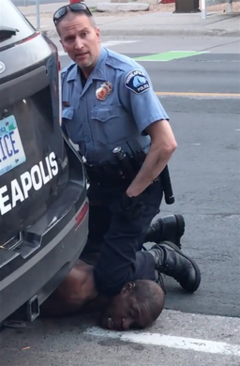
She said the nation reached a ‘boiling point.’
Frederick, Md. (KM) – Wednesday, May 25th marks the second anniversary of the death of George Floyd. He died after a Minneapolis police officer place his knee Floyd’s neck, with Floyd calling out “I can’t breathe.”
That incident brought out protests and some unrest in the country, with many African-Americans feeling that they were victims of social injustice in the United States.
There was a demonstration at Baker Park in Frederick. One of the speakers was local social justice activist Dajah Gee. “In a sense, I felt like we had reached like a boiling point in our country,”: says Gee, who was a guest Monday on WFMD’s “Morning News Express.”
“Right now, with everything that’s happening in the news, the unfortunate shooting that happened in Buffalo {NY} , I feel like anxiety is at an all time high just walking around as a Black individual,” Gee continues.
In that case in Buffalo, ten people were killed by a lone shooter at a Tops Friendly supermarket, a majority were African-Americans. Police there have arrested a suspect.
Gee says it may be time for African-Americans to pause and look inward. “I feel like everybody kind of deals with it on their own in their own way,”: she says. “We need to create safe spaces for us to do that.”
The death of George Floyd and the rallies and unrest that followed led to the creation of the Black Lives Matter movement. A recent report said BLM’s leadership had misappropriated $90-million in donations. Gee said she made a contribution to the movement in the past., but may not do it again. “I wouldn’t necessarily throw my money to them,” she said. “:But I would still support in other aspects. I do think there are small businesses I can definitely donate.”
As for reports of Black on Black crime in larger cities like New York, Chicago and Detroit, Gee says there’s so much more to this issue, such as a lack of opportunity on the part of children from low income urban areas. “They lack the resources I had first hand growing in a place like Frederick, Maryland,” she said. “You’re speaking to a bunch of kids whose education system is definitely setting up for them to fail.”
By Kevin McManus